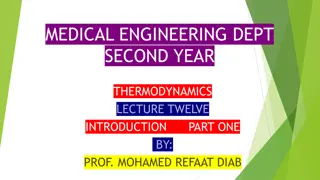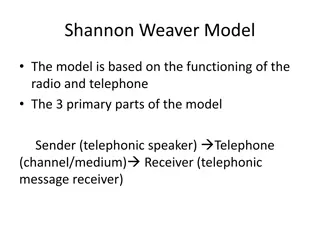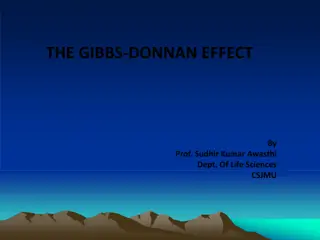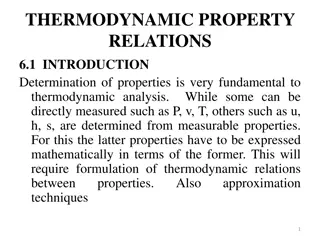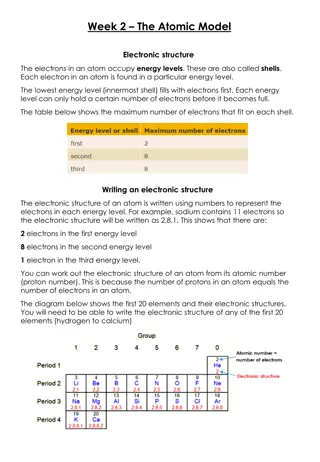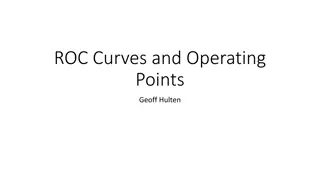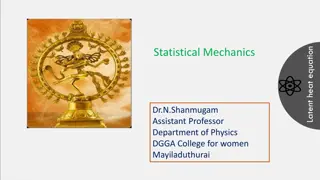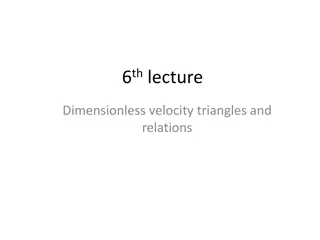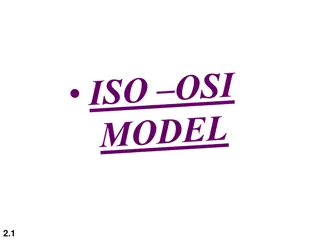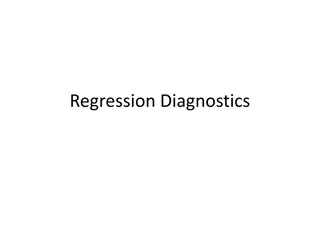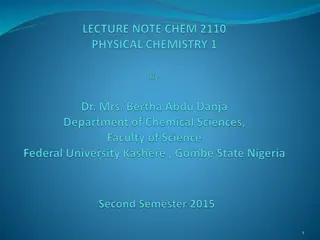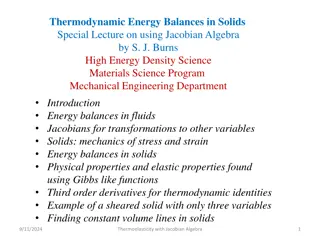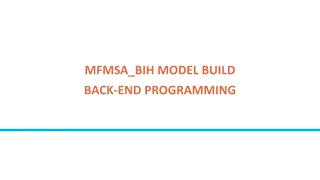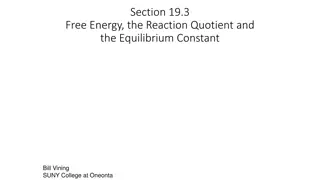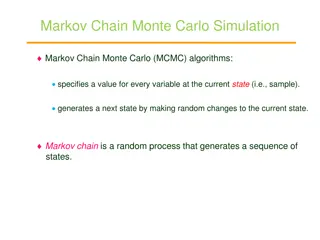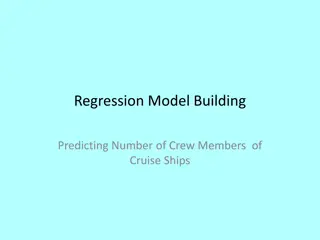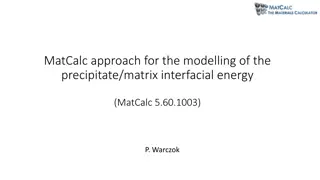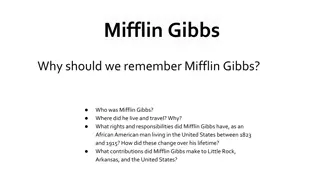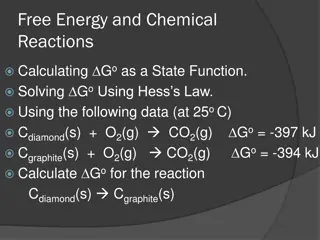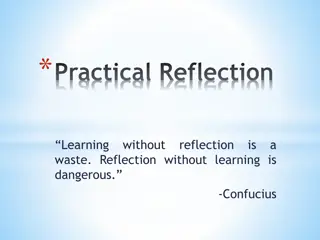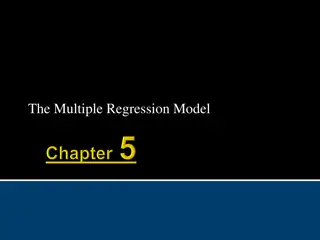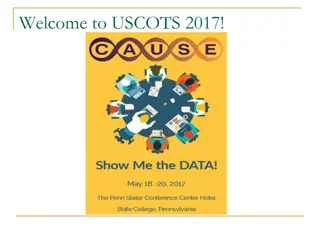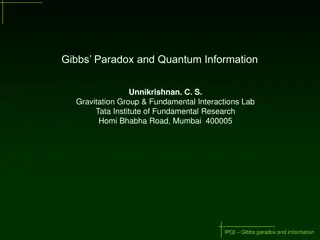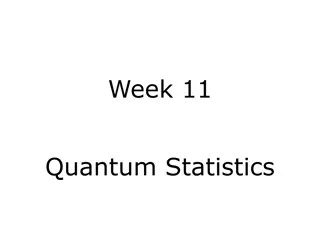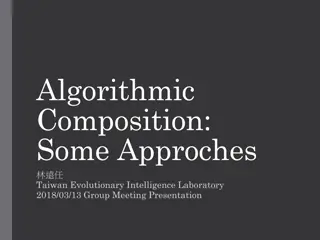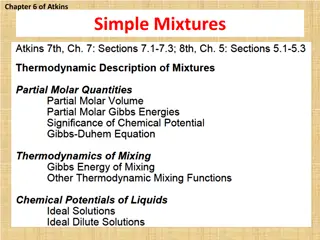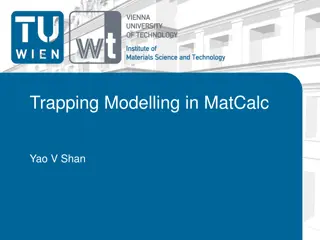Building a Macrostructural Standalone Model for North Macedonia: Model Overview and Features
This project focuses on building a macrostructural standalone model for the economy of North Macedonia. The model layout includes a system overview, theory, functional forms, and features of the MFMSA_MKD. It covers various aspects such as the National Income Account, Fiscal Account, External Accoun
2 views • 23 slides
NAMI Family Support Group Model Overview
This content provides an insightful introduction to the NAMI family support group model, emphasizing the importance of having a structured model to guide facilitators and participants in achieving successful support group interactions. It highlights the need for a model to prevent negative group dyn
6 views • 23 slides
Understanding Chemical Potential and Phase Equilibria in Solution Thermodynamics
The chemical potential and phase equilibria in solution thermodynamics are crucial concepts for understanding the behavior of mixtures at varying compositions and conditions. By investigating the fundamental property relation, partial molar properties, and the role of Gibbs energy, we can grasp how
5 views • 25 slides
Understanding Maxwell Equations in Thermodynamics
In thermodynamics, Maxwell equations are derived using Euler's reciprocity relation. They involve characteristic functions such as internal energy, free energy, enthalpy, and Gibbs free energy, along with parameters like temperature, entropy, pressure, and volume. These equations form the foundation
0 views • 15 slides
Understanding Entity-Relationship Model in Database Systems
This article explores the Entity-Relationship (ER) model in database systems, covering topics like database design, ER model components, entities, attributes, key attributes, composite attributes, and multivalued attributes. The ER model provides a high-level data model to define data elements and r
1 views • 25 slides
Communication Models Overview
The Shannon-Weaver Model is based on the functioning of radio and telephone, with key parts being sender, channel, and receiver. It involves steps like information source, transmitter, channel, receiver, and destination. The model faces technical, semantic, and effectiveness problems. The Linear Mod
0 views • 8 slides
Understanding Reaction Isotherms and Equilibrium Constants
Explore reaction isotherms and equilibrium constants through Vant Hoff's and Gibbs free energy equations. Learn about the relationship between Gibbs free energy, equilibrium constant, and temperature dependence. Discover how these concepts are applied in determining the direction of chemical reactio
2 views • 18 slides
Understanding the Gibbs-Donnan Effect in Biological Systems
The Gibbs-Donnan Effect, named after physicists Gibbs and Donnan, explains the selective permeability of membranes to ions, leading to the establishment of Donnan potential. This phenomenon affects the distribution of ions and proteins across cell membranes, influencing processes like osmosis and io
0 views • 27 slides
Fundamentals of Thermodynamic Property Relations
Determining thermodynamic properties is crucial for analysis, involving direct and derived properties expressed through formulations and relations. Partial derivatives, fundamental relations like the 1st and 2nd laws, and functions such as enthalpy, Helmholtz, and Gibbs are explored. Maxwell relatio
2 views • 56 slides
Understanding Atomic Structure: Electrons, Energy Levels, and Historical Models
The atomic model describes how electrons occupy energy levels or shells in an atom. These energy levels have specific capacities for electrons. The electronic structure of an atom is represented by numbers indicating electron distribution. Over time, scientists have developed atomic models based on
0 views • 5 slides
Understanding ROC Curves and Operating Points in Model Evaluation
In this informative content, Geoff Hulten discusses the significance of ROC curves and operating points in model evaluation. It emphasizes the importance of choosing the right model based on the costs of mistakes like in disease screening and spam filtering. The content explains how logistical regre
7 views • 11 slides
Understanding Phase Transformations and Latent Heat Equation in Statistical Mechanics
In this informative piece by Dr. N. Shanmugam, Assistant Professor at DGGA College for Women, Mayiladuthurai, the concept of phase transformations in substances as they change states with temperature variations is explored. The latent heat equation is discussed along with definitions of fusion, vapo
1 views • 22 slides
Understanding Dimensionless Velocity Triangles and Relations in Turbomachinery
Explore the concept of dimensionless velocity triangles for passive and active machines, power coefficients, Gibbs equation, static enthalpy coefficients, degree of reaction based on enthalpy and pressure changes, and Euler's turbine formula in kinematic form. Gain insights into the relationships an
0 views • 17 slides
Understanding the OSI Model and Layered Tasks in Networking
The content highlights the OSI model and layered tasks in networking, explaining the functions of each layer in the OSI model such as Physical Layer, Data Link Layer, Network Layer, Transport Layer, Session Layer, Presentation Layer, and Application Layer. It also discusses the interaction between l
2 views • 41 slides
Regression Diagnostics for Model Evaluation
Regression diagnostics involve analyzing outlying observations, standardized residuals, model errors, and identifying influential cases to assess the quality of a regression model. This process helps in understanding the accuracy of the model predictions and identifying potential issues that may aff
1 views • 12 slides
Risk and Resilience Factors in LGBTQ2S Populations
This presentation by Ernie Gibbs, a Mental Health Counsellor, explores risk and resilience factors impacting LGBTQ2S youth. It delves into terminology, risk factors like depression and violence, as well as resilience factors such as family acceptance and access to medical transition services. The di
0 views • 10 slides
Understanding Kinetic Theory of Gases and Thermodynamics
Explore the fundamental principles of the kinetic theory of gases, including the five postulates and the relationship between macroscopic properties and microscopic phenomena. Delve into the concept of entropy and thermodynamics, along with the behavior of ideal and real gases. Gain insights into th
0 views • 116 slides
Understanding Thermodynamic Energy Balances in Solids with Jacobian Algebra
Explore the intricacies of energy balances in solids through the lens of Jacobian algebra, covering topics such as mechanics of stress and strain, Gibbs-like functions for physical properties, and third-order derivatives for thermodynamic identities. Unravel the application of Jacobians for transfor
2 views • 26 slides
Mrs. Gibbs' First Grade Class Information
Welcome to Mrs. Gibbs' First Grade Class! Join us for a year of fun, learning, and community. Meet Mrs. Gibbs and learn about her family, goals, class subjects, classroom community, homework expectations, and school policies like tardiness. Get ready for an exciting year ahead!
0 views • 10 slides
MFMSA_BIH Model Build Process Overview
This detailed process outlines the steps involved in preparing, building, and debugging a back-end programming model known as MFMSA_BIH. It covers activities such as data preparation, model building, equation estimation, assumption making, model compilation, and front-end adjustment. The iterative p
0 views • 10 slides
College Planning Night at Gibbs High School Counseling Office
Gibbs High School hosts a College Planning Night with school counselors and representatives from colleges discussing topics like what college is, types of degrees, planning for college, and how to pay for college. Students learn about different degree options like diplomas, certificates, associate d
1 views • 30 slides
Understanding Free Energy, Reaction Quotient, and Equilibrium Constant
This educational material delves into the concepts of free energy, reaction quotients, and equilibrium constants in chemical systems. It explains how to determine the direction of a reaction based on Q and K values, elucidates the role of Gibbs free energy in determining spontaneity, and provides ca
0 views • 10 slides
Proposal for Radio Controlled Model Aircraft Site Development
To establish a working relationship for the development of a site suitable for radio-controlled model aircraft use, the proposal suggests local land ownership with oversight from a responsible agency. Collins Model Aviators is proposed as the host club, offering site owner liability insurance throug
0 views • 20 slides
UBU Performance Oversight Engagement Framework Overview
Providing an overview of the UBU Logic Model within the UBU Performance Oversight Engagement Framework, this session covers topics such as what a logic model is, best practice principles, getting started, components of the logic model, evidence & monitoring components, and next steps. The framework
1 views • 33 slides
Understanding MCMC Algorithms and Gibbs Sampling in Markov Chain Monte Carlo Simulations
Markov Chain Monte Carlo (MCMC) algorithms play a crucial role in generating sequences of states for various applications. One popular MCMC method, Gibbs Sampling, is particularly useful for Bayesian networks, allowing the random sampling of variables based on probability distributions. This process
1 views • 7 slides
Regression Model for Predicting Crew Size of Cruise Ships
A regression model was built to predict the number of crew members on cruise ships using potential predictor variables such as Age, Tonnage, Passenger Density, Cabins, and Length. The model showed high correlations among predictors, with Passengers and Cabins being particularly problematic. The full
0 views • 16 slides
Understanding MatCalc Approach for Modelling Precipitate/Matrix Interfacial Energy
MatCalc app provides a detailed examination of the precipitate/matrix interfacial energy modeling by considering various contributions to Gibbs energy, classical nucleation theory, coarsening (Ostwald ripening), and estimation methods like the Becker concept. The interface energy is crucial for unde
1 views • 33 slides
Analyzing "The Test" by Angelica Gibbs: Themes of Prejudice and Injustice
The Test" by Angelica Gibbs is a short story that delves into themes of prejudice, injustice, and racism. Through the experiences of the protagonist, Marian, the narrative explores how discrimination affects individuals. The story prompts readers to reflect on issues of bias and unfair treatment in
0 views • 50 slides
Mifflin Gibbs: Trailblazer of Little Rock
Mifflin Gibbs, the first colored judge in the United States, lived an impactful life between 1823 and 1915. He made significant contributions to Arkansas and the U.S., overcoming challenges as an African American man. Gibbs's journey, achievements, and the evolving rights and responsibilities he fac
0 views • 13 slides
Understanding Free Energy and Chemical Reactions
Exploring concepts like Gibbs free energy, standard free energy of formation, equilibrium, and Hess's Law in chemical reactions. The feasibility of reactions, equilibrium constants, and the impact of pressure on free energy are all discussed.
0 views • 17 slides
Enhancing Learning Through Reflective Practices: A Comprehensive Guide
Explore the significance of reflection in professional development, understanding various reflective practices, and engaging in activities to foster individual and group reflection. Discover the dynamics of cyclical learning, the cognitive and affective aspects of reflection, frameworks for improvem
0 views • 12 slides
Principles of Econometrics: Multiple Regression Model Overview
Explore the key concepts of the Multiple Regression Model, including model specification, parameter estimation, hypothesis testing, and goodness-of-fit measurements. Assumptions and properties of the model are discussed, highlighting the relationship between variables and the econometric model. Vari
2 views • 31 slides
Show Me the Data: Highlights from USCOTS 2017
USCOTS 2017 had a theme centered around data-driven decision-making in education. The event featured insightful presentations by renowned speakers like Chris Wild and Alison Gibbs. Attendees were encouraged to engage with data visualization and explore the realm of data science. The event emphasized
0 views • 17 slides
Gibbs Paradox and Quantum Information: Understanding Entropy and Resolution
Description of the Gibbs problem of entropy mixing gases, conventional resolution, issues of (dis)continuity, the role of indistinguishability and quantum mechanics in resolution, dissenting views, necessity of quantum mechanics, and the relationship between statistical mechanics and entropy. Key di
0 views • 19 slides
Quantum Statistics in Physical Systems
In the realm of quantum statistics, various ensembles such as the grand canonical ensemble play a crucial role in describing the behavior of systems like gases and biological molecules. Understanding concepts such as Gibbs factor, chemical potential, and the probabilities of states being occupied sh
0 views • 19 slides
Exploring Algorithmic Composition Techniques in Music Generation
Algorithmic composition involves the use of algorithms to create music, mimicking human composers by generating music based on specific rules and structures. This presentation delves into various approaches such as DeepBach, MuseGAN, and EMI, highlighting the use of evolutionary algorithms, machine
0 views • 35 slides
Understanding Partial Molar Quantities and Chemical Potential
Exploring partial molar quantities and chemical potential in thermodynamics helps us understand how system variables change with composition alterations. Through concepts like partial molar volumes and Gibbs free energy, we can delve into the intricate dynamics of thermodynamic systems and their beh
0 views • 23 slides
Understanding Thermodynamics of Mixing in Atkins: Chapter 6 Overview
Unveil the intricacies of Chapter 6 from Atkins' book on Simple Mixtures. Delve into topics like Partial Molar Volume, Gibbs Energies, Chemical Potential, Gibbs-Duhem Equation, Thermodynamics of Mixing, and more. Explore key concepts such as Gibbs Energy of Mixing, Raoult's Law, Molecular Interpreta
0 views • 22 slides
Football and Wrestling: A Winning Combination in Sports
In the world of sports, football and wrestling have shown a strong bond as several NFL players have excelled in both disciplines. From John Madden advocating for offensive linemen to wrestle to Joe Gibbs preferring wrestlers for their toughness, the connection is evident. Notable NFL stars like Ray
0 views • 20 slides
Trapping Modelling in MatCalc: Understanding Gibbs Energy and Configurational Entropy
Trapping modelling in MatCalc involves studying the entrapment of atoms on lattice defects like solute atoms and dislocations. This process affects the system's energy and concentration, with parameters such as trapping enthalpy, nominal composition, and molar volume playing vital roles. By consider
0 views • 21 slides



